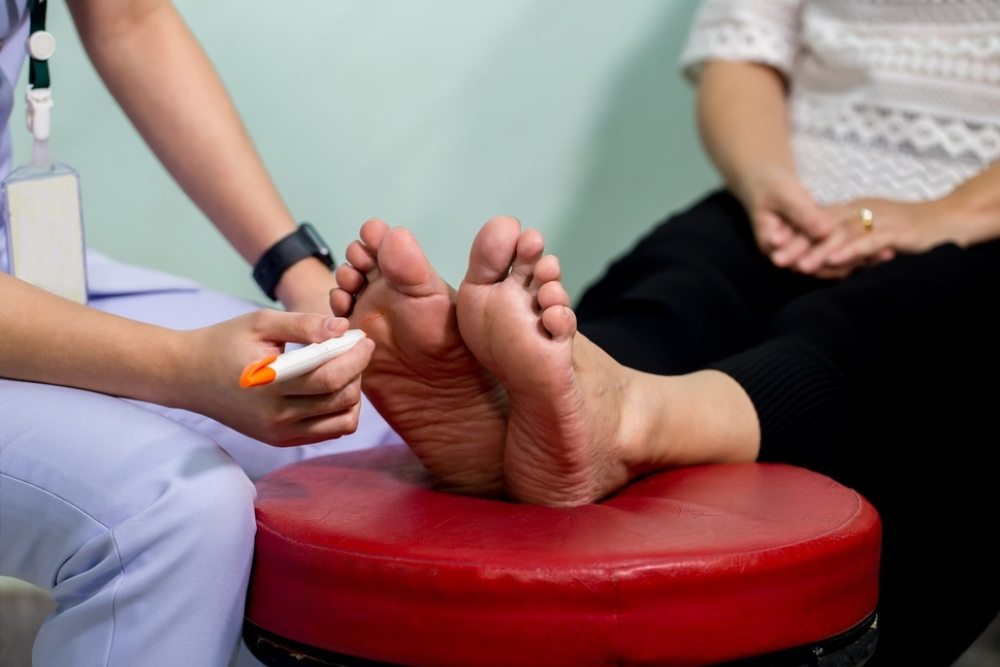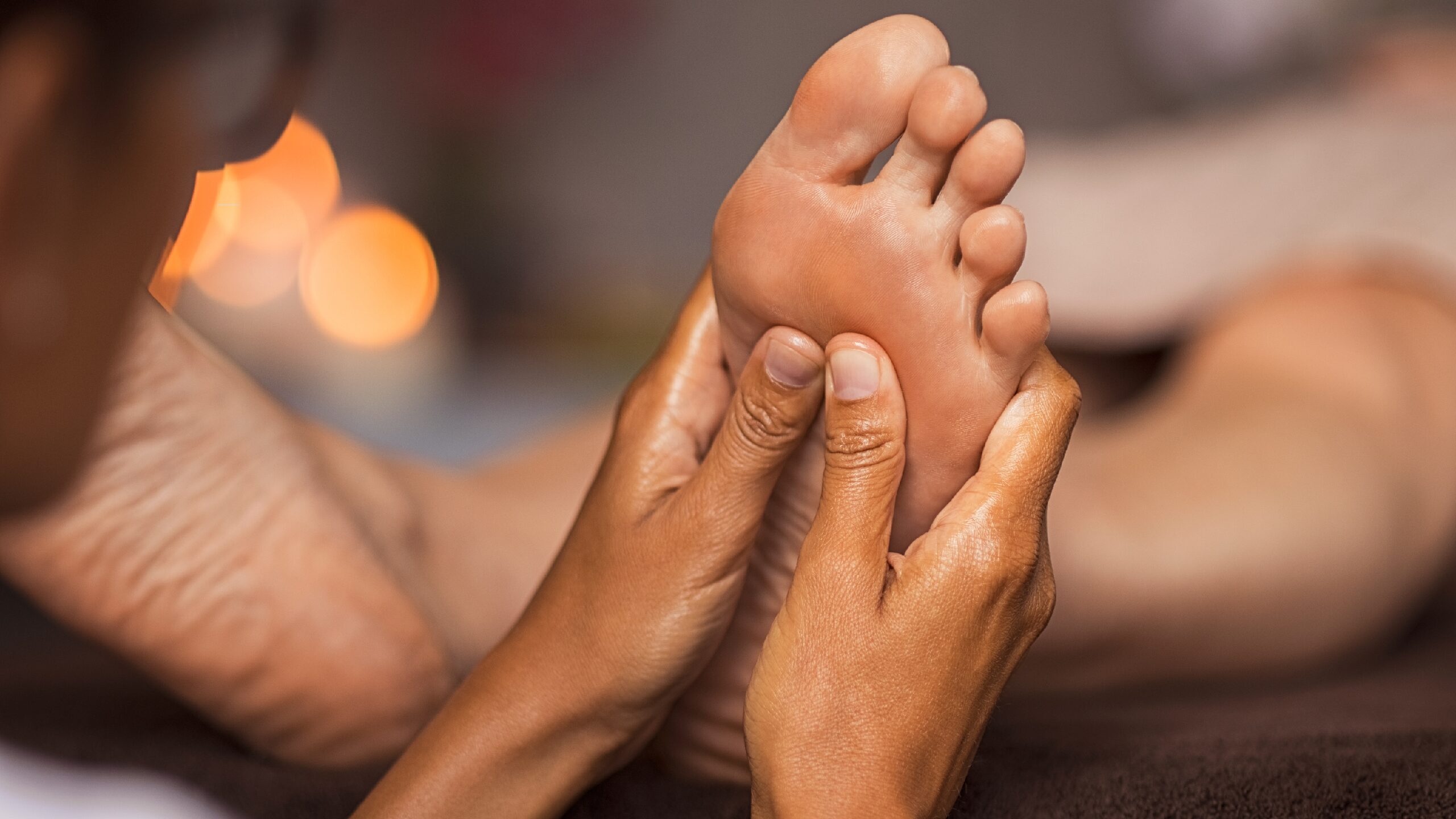
A Walk Towards Healthy Feet: Common Foot Problems and Solutions
October 26, 2023
How to Relieve a Stiff Neck After Waking Up
November 8, 2023Nutritional Requirements for Diabetic Foot Ulcer: A Tailored Approach to Keeping Your Feet Healthy
When dealing with diabetic foot ulcers, most people focus on medical treatments such as antibiotics, debridement, and proper wound care. However, nutrition plays a pivotal role in supporting the body’s natural healing process, stabilizing blood sugar levels, and preventing further complications. This blog post “Nutritional Requirements for Diabetic Foot Ulcer ” explores why adequate nutrition is essential for healing diabetic foot ulcers and what dietary practices can help optimize recovery.
Understanding Diabetic Foot Ulcers
A diabetic foot ulcer typically occurs as an open sore or wound on the foot. In people with diabetes, high blood sugar levels can damage nerves (leading to peripheral neuropathy) and reduce blood flow (leading to peripheral arterial disease), making it harder for the body to heal wounds. If left untreated, these ulcers can worsen and increase the risk of infection and, in severe cases, amputation.
Given the gravity of these complications, it’s important to address all facets of health when caring for diabetic foot ulcers—nutrition being a major one. Proper dietary habits help stabilize blood sugar levels, promote tissue repair, and strengthen the immune system.
Why Nutrition Matters for Healing
- Blood Sugar Control: Stable blood sugar levels support wound healing. When blood sugar is chronically high, it impairs immune function and slows down the formation of new tissue.
- Immune Function: Certain nutrients (e.g., vitamins A, C, E, and zinc) are essential for maintaining an efficient immune response. This immune support is crucial in preventing infections in diabetic foot ulcers.
- Tissue Repair and Regeneration: Protein and essential fatty acids facilitate the production of new tissue, collagen formation, and repair of damaged cells—all critical steps in the wound-healing process.
- Reduced Inflammation: A diet rich in antioxidants and omega-3 fatty acids can help manage inflammation, allowing the body to focus more effectively on wound repair.
Key Nutrients for Diabetic Foot Ulcer Healing
- Protein
- Importance: Protein is vital for building and repairing tissues. It also supports immune function, which helps prevent and fight infections.
- Sources: Lean meats (chicken, turkey), fish, low-fat dairy, legumes (beans, lentils), tofu, and eggs.
- Vitamin C
- Importance: Crucial for collagen production—a protein that gives structure to the skin and other tissues. Collagen helps wounds close and heal faster.
- Sources: Citrus fruits (oranges, grapefruit), bell peppers, strawberries, broccoli, and leafy greens.
- Vitamin A
- Importance: Supports wound healing by assisting in cell growth and immune function.
- Sources: Sweet potatoes, carrots, spinach, kale, and fortified dairy products.
- Vitamin D
- Importance: Helps regulate immune responses and maintains bone health. Adequate levels are associated with better wound-healing outcomes.
- Sources: Fatty fish (salmon, mackerel), fortified dairy or plant-based milks, egg yolks, and exposure to sunlight.
- Zinc
- Importance: Plays a vital role in protein synthesis and cell growth, both necessary for tissue repair.
- Sources: Lean meats, shellfish, beans, nuts, and whole grains.
- Omega-3 Fatty Acids
- Importance: Known for their anti-inflammatory properties, which can help create an optimal environment for healing.
- Sources: Fatty fish (salmon, sardines, tuna), chia seeds, flaxseeds, and walnuts.
- Fiber
- Importance: Helps regulate blood glucose levels, which is critical for individuals with diabetes. Keeping blood sugar within target range can enhance the body’s healing capabilities.
- Sources: Whole grains (brown rice, oatmeal), fruits, vegetables, beans, and legumes.
Balancing Carbohydrates, Proteins, and Fats
The macronutrient balance (carbs, proteins, and fats) is especially important for people with diabetes. Here are some tips:
- Monitor Carbohydrate Intake
- Focus on complex carbohydrates like whole grains, legumes, and vegetables. These release glucose more slowly, helping keep blood sugar levels stable.
- Avoid or limit sugary foods and refined grains (white bread, pastries, soda).
- Choose Quality Proteins
- Include lean sources of protein (chicken, fish, beans) in every meal to support tissue repair.
- Spread your protein intake throughout the day to maintain a consistent supply of amino acids.
- Incorporate Healthy Fats
- Prioritize unsaturated fats (olive oil, avocados, nuts) and omega-3 sources (salmon, walnuts, flaxseeds) to reduce inflammation.
- Limit saturated and trans fats found in fried and processed foods.
Practical Dietary Tips
- Meal Planning: Work with a registered dietitian or certified diabetes educator to create a personalized meal plan. This ensures you get the nutrients you need to aid healing without spiking blood sugar levels.
- Portion Control: Measuring serving sizes and using portion-control methods (like the Plate Method) can help maintain balanced blood sugar levels and ensure adequate nutrient intake.
- Focus on Whole, Unprocessed Foods: Fresh fruits and vegetables, lean proteins, whole grains, and low-fat dairy are generally better than heavily processed alternatives. They contain more essential nutrients and fewer additives.
- Stay Hydrated: Proper hydration helps with circulation, digestion, and nutrient delivery to tissues. Aim for at least 6–8 cups of water per day, unless otherwise advised by your healthcare provider.
- Monitor Blood Glucose: Regular self-monitoring of blood sugar allows for better dietary adjustments and can help gauge how different foods affect your glucose levels.
- Consider Supplements: In some cases, a healthcare provider may recommend vitamin or mineral supplements to address specific deficiencies. Never start supplements without medical advice, as some vitamins or minerals can interact with medications.
Wound Care and Medical Support
While nutrition is a cornerstone of diabetic foot ulcer management, it works best in tandem with medical treatment and proper wound care. Regular check-ups with a podiatrist or wound-care specialist, wearing appropriate footwear, and practicing proper foot hygiene are essential steps to a healthy recovery.
If you notice signs of infection—such as increased redness, swelling, or discharge—contact your healthcare team immediately. Prompt action can prevent complications and speed up the healing process.
Nutritional Requirements for Diabetic Foot Ulcer: Conclusion
Diabetic foot ulcers are a serious complication that demand a multifaceted approach to care. Along with medical intervention and diligent wound care, nutrition stands out as a critical factor in healing and preventing further complications. By focusing on a balanced diet rich in protein, vitamins, minerals, and healthy fats, you can support your immune system, regulate your blood sugar, and give your body the resources it needs to heal effectively.
Remember, effective management of diabetic foot ulcers requires ongoing collaboration with healthcare professionals—such as nutritionists, diabetologists, and wound-care specialists. Don’t hesitate to seek personalized advice and monitoring, ensuring that your nutritional needs are met for the best possible outcomes.
Role of Healthcare Professionals in Diabetic Foot Care
Podiatrists and other healthcare professionals have the expertise to provide comprehensive foot care for individuals with diabetes. They can assess your foot health, manage existing problems, educate about self-care practices, and recommend appropriate treatments or interventions when necessary.
By adopting a tailored approach to diabetic foot care, individuals with diabetes can minimize the risk of foot complications and maintain healthy feet. Remember, at At Center For Specialty Care, we are here to guide you through the process of prevention, daily care, and professional guidance. These are key steps to promoting optimal foot health and overall well-being.




